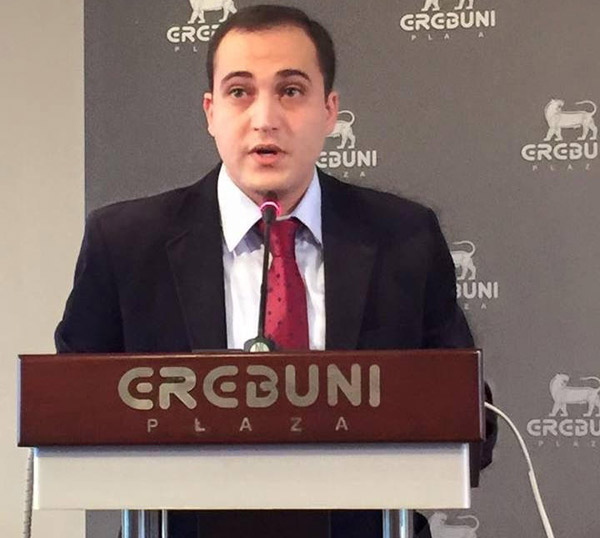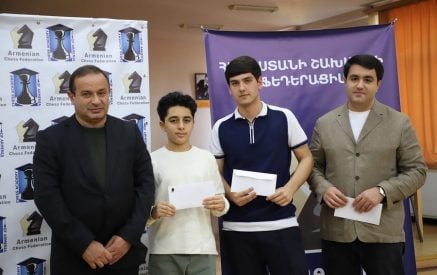According to the Chairman of the “Civil Consciousness” Liberal NGO Narek Samsonyan, the absence of wide public support to the means of change the armed group had chosen made them surrender.
-The two-week crisis has ended. Members of the armed group “Sasna Tsrer” laid down their arms and surrendered. Narek, why did it happen? What happened in general? What situation Armenia has appeared in?
-First of all, I would like to approbate the decision made by the two sides to reach a settlement without further bloodshed. Generally, the men of “Founding Parliament” had better make the decision of laying down their arms before the second victim, as on the third day of the invasion it became clear that what had been done by the armed group didn’t enjoy wide public support and, in fact, the coup d’état attempt was doomed to failure. As for the reasons why such a thing happened, the answer is quite simple-throughout its activities the “Founding Parliament” openly declared about its intention of carrying out an armed coup d’état. Plus, a couple of days prior to the invasion of the Security Patrolling Service regiment, with his direct appeal Jirayr Sefilyan gave instructions to that group to swing into concrete actions. The group did what it had supposed to do and the National Security Service of the Republic of Armenia proved once again that in professional terms it is incapable of neutralizing obvious threats. Though, taking into account the recent resignations in the NSS, I think this incident was the result of sabotage performed by the responsible department within the security service.
-Once again the need for “lessons learnt” is being spoken about. Several days ago Serzh Sargsyan announced that, nevertheless, the complete denouement still lies ahead. How do you assess the overall reaction of the authorities, opposition and the society to what had happened? It is time to make judgments keeping a cool head. How will Armenia move forward?
Read also
-I do not think that the “Founding Parliament” or those vindicating the invasion of Security Patrolling Service regiment should have any positive expectations from the “complete denouement” mentioned by Serzh Sargsyan. What happened in the period from July 17 to July 31, 2016 in a political context only strengthened Serzh Sargsyan’s positions. In fact, the number of supporters of the “Founding Parliament” did not increase neither before the invasion of the Security Patrolling Service regiment nor during the following days. The level of public support in street demonstrations was not enough even for overcoming the threshold of any national election. And even though there is quite a lot of discontent among the society over the ruling political force, its collective reaction was quite adequate. Eventually, it should be noted that the absence of wide public support to the means of change “Daredevils of Sassoun” (“Sasna Tsrer”) had chosen made the armed group surrender; otherwise the opposite would have had unpredictable consequences for our country.
-It is obvious that there is a public outcry in Armenia. The invasion of the Security Patrolling Service regiment was accompanied by mass rallies, street demonstrations and clashes. Ahead of 2017 elections it seemed that the society would not rebel without a strong opposition leader. What does this indicate? Does it point out that, nevertheless, nothing is lost? Is public activeness possible in 2017? What political forces do you foresee leading the part of society with oppositional views?
-If we consider street processes following the invasion of Security Patrolling Service regiment as massive (referring to its populousness), then it can only be considered massive in comparison with the “Founding Parliament’s” previous experiences in public demonstrations. In fact, those events were attended by not more than 5-7 thousand people, which considering massive, to put it mildly, is an exaggeration. As for the issue why those processes never gained political essence, I think it has nothing to do with the absence of proper leaders. The street processes did not gain political essence, because, initially, the cause that provoked all that was not of political origin and even if instead of Paruyr Hairikyan other well-known opposition leaders mounted the platform and spoke to the assembled crowd, that platform would not have become a political one, anyway. Our society’s such a reaction to the attempt of bringing about political changes by means of violence indicates the fact that our society does not accept such attempts, despite the consistent degradation policy run by the authorities of all time. This, in my opinion, is quite a positive impulse. Before the NA elections there will be numerous changes within the political field, but in one thing I am sure – none of the political forces justifying the invasion of the SPS regiment by the members of “Founding Parliament” will get people’s vote in 2017 and none of those forces will win mandates.
-Aftermath July 17 there were widely discussed different versions of possible external interference, mainly Russian and Western. On the other hand, there is widespread information according to which the President of the Republic of Armenia is under serious pressure as connected to the Nagorno-Karabakh conflict issue. Before the surrender one of the “Sasna Tsrer” members announced that there was a need to fight against decolonization of Armenia, the arrows of criticism were directed to Russia, particularly to Armenia’s dependency from the Russian Federation. All these were interdependent and interconnected. What do you think of this?
-First of all, let us fix that even if there is a possibility of external interference when no matter what kind of process is being worked out in our country, that very possibility can exclusively be used by Russia. All those people or political forces that look for Western traces here had better not do politics. As for the versions discussed of external interference in the issue of the SPS regiment invasion, I do not take them seriously, as long as those are groundless yet.
As for the existing pressure on the negotiation process over the Nagorno-Karabakh conflict, it is not a discovery. Recently this pressure has logically increased and the invasion of the SPS regiment by the “Founding Parliament” has significantly weakened Serzh Sargsyan’s positions in the foreign arena. While from the platform of “decolonization” movement brought forward by Varuzhan Avetisyan, Ashot Manucharyan makes speeches. I think this says it all. Only one thing can be added to; it is pretty ridiculous to hear those people speak about decolonization and call for fighting against it who were officially hosted in the Embassy of the Russian Federation in Armenia only several months ago. So, those appeals, to put it mildly, are far from being serious.
– What is your opinion on the matter of the recent dismissals? Particularly, what stands behind the resignation of the Prosecutor General of the RA and the dismissal of the First Deputy Director of the National Security Service of the RA?
– I do not think that the resignation of Gevorg Kostanyan is anyhow connected to the invasion of the SPS regiment. What I do think is that previously Mr. Kostanyan had pretty more reasons to resign, which he did not do and in this case the incident of invading the SPS regiment can hardly be the real reason for his resignation. The situation with the dismissal of the First Deputy Director of the National Security Service of the RA looks different. As we all know, the NSS has a general administration of enforcing the constitutional order and fighting against terrorism, whose job is to prevent similar situations.
As we have already noted, the NSS’s main oversight resulting in the invasion of the SPS regiment belongs to this very administration. Had long been working in the system the First Deputy Director of NSS must have possessed relevant information on the impending attack and consequently must have notified the Director of the National Security Service. I believe, the main reason for dismissing Mr. Yepiskoposyan was either not possessing relevant information on the impending attack on the regiment, or possessing the information and not reporting about that. The latter is more likely taking into account the fact that the newly appointed Director of NSS is a newcomer to the system, moreover, the same Mr. Yepiskoposyan was once pretending on the position of the Director of NSS.
-Currently, the situation caused by the police brutality on July 29 is being discussed. In his speech President Serzh Sargsyan asked the news reporters to forget the incident and gave his word that never will such a thing happen again to them. Meanwhile, several police officers were subjected to a wide range of administrative penalties by the Head of the Police of the RA including the Chief of the Yerevan Police Department. What do you think; are these punishments proportionate to what happened?
-I do not think that these administrative penalties or even dismissal of several police officers are enough at least for preventing such acts of police brutality in future. The police with its last notorious actions proved once again that all the statements have been made about reforms all these years were simply fake. Firstly, as a result of police improper conduct on July 29 the demonstrators managed to break through the police cordon reaching Sari Tagh quarter. Secondly, via live streaming we all witnessed plainclothes police officers passing behind the police cordon and, according to news reporters and demonstrators, those plainclothes police officers were the ones to bitterly commit violence against the people. In the current situation, at least several more police officers must be subjected to criminal liability if the police wants to save its face. Otherwise, even the severe reprimand given by the Head of the Police of the RA is in vain.
-The Freedom Square continues to host demonstrators who have come there in support of “Sasna Tsrer”. How do you think these street demonstrations are going to further and what impact could they have on internal political processes?
-As I have already mentioned, those processes neither initially nor, moreover, now can have any substantial impact on internal political processes. When the armed group was still in the territory of the invaded SPS regiment, much more people were active in the streets. Their number was significantly big, but even in that case we never witnessed any political manifestation. Now only several hundred of people participate in these street demonstrations. Moreover, speeches made from the platform are far from even facile rhetoric specific to social movements. There is neither political text, nor an action plan, and, consequently, strategy, tactics and road map are missing. With a similar approach of an amateur level to even problems relating to condominium issues is impossible, let alone the probability of having significant impact on political processes. I believe that some of political forces will try to make a start on their upcoming NA election campaigns and make all these street demonstrations as well as the “Founding Parliament’s” invasion of the SPS regiment work for that purpose. In all probability, with such an alliance they will join the election race, but, as I have already noted, they will not be able to overcoming the threshold. In the end they will meet the fate other non political units had met so far.
EMMA GABRIELYAN






















































